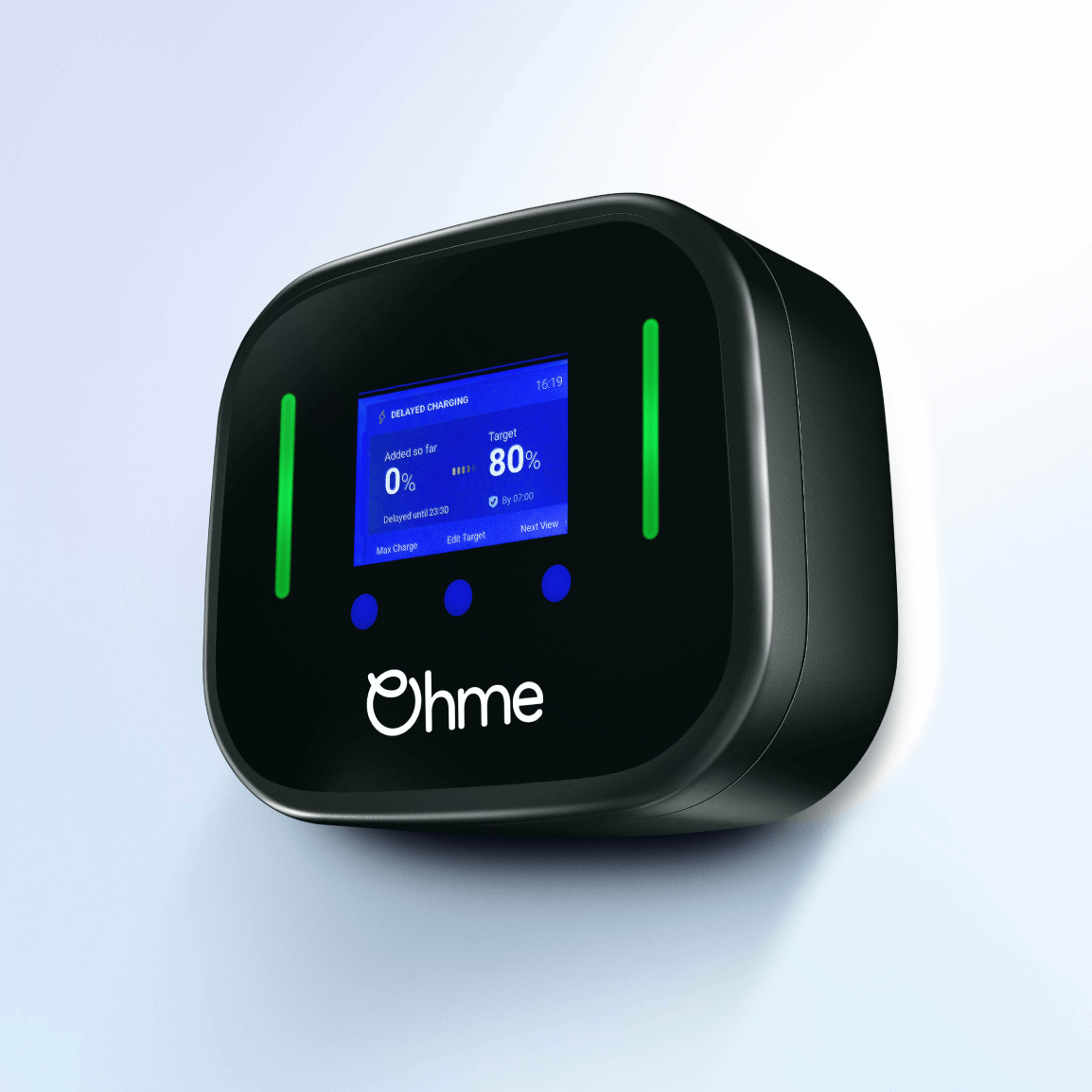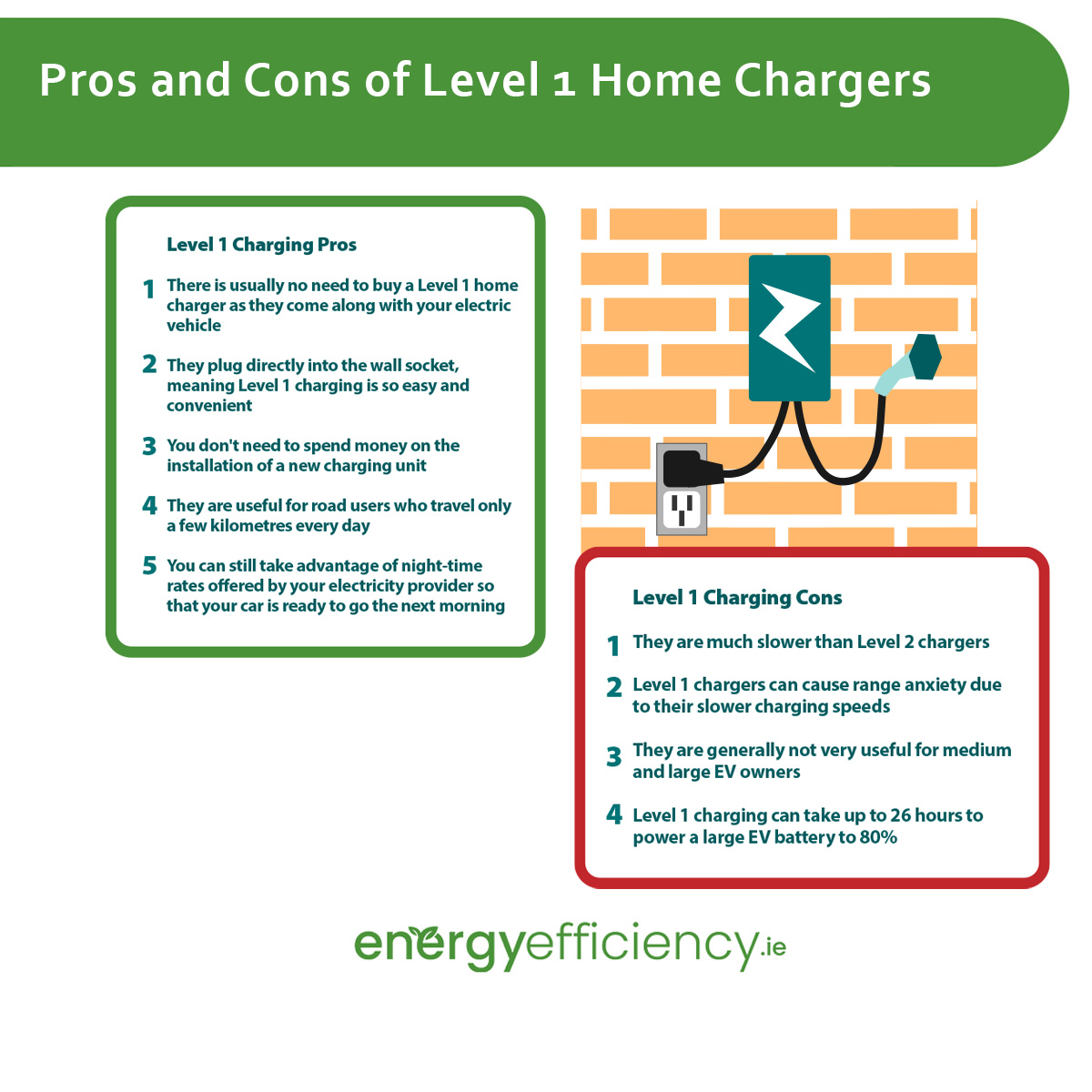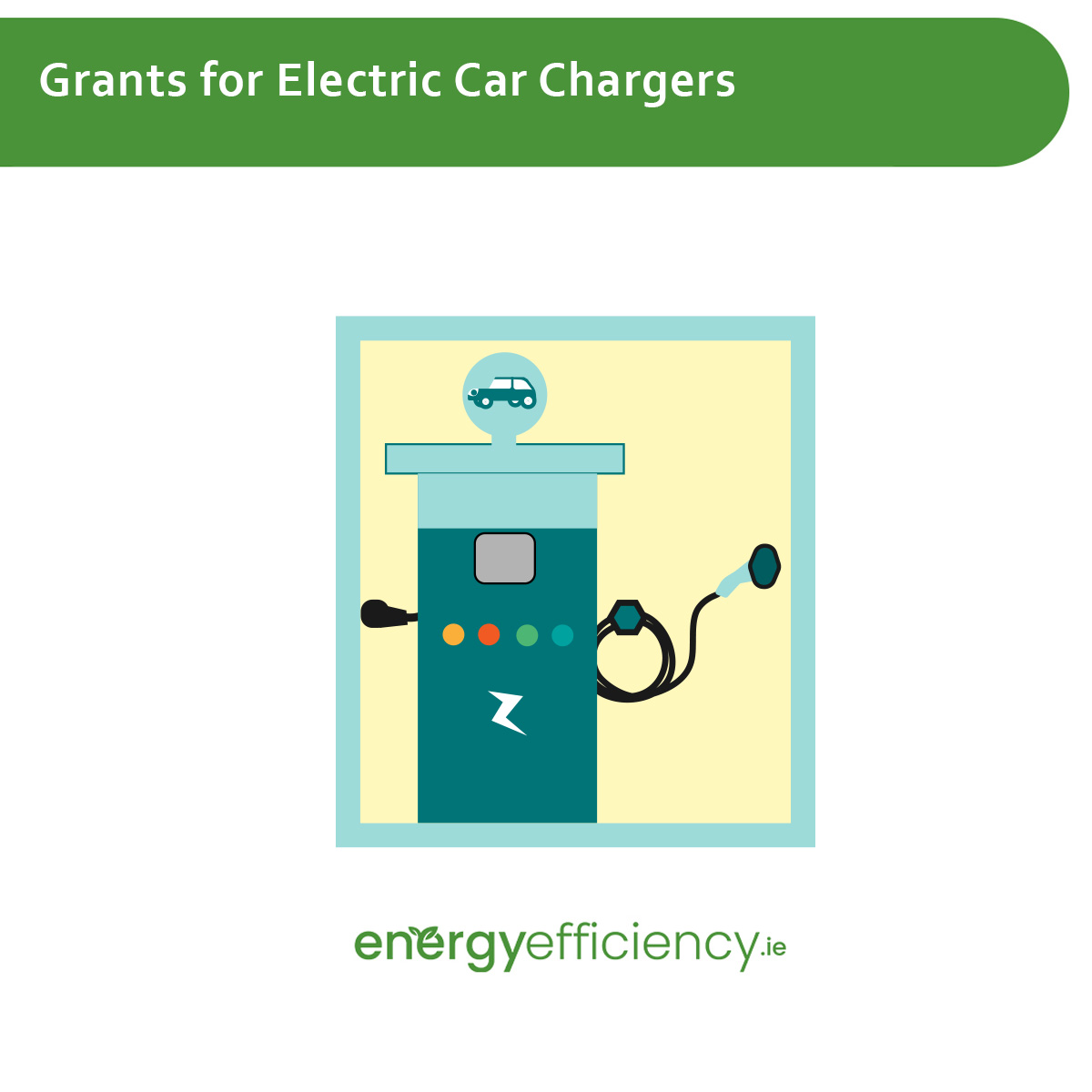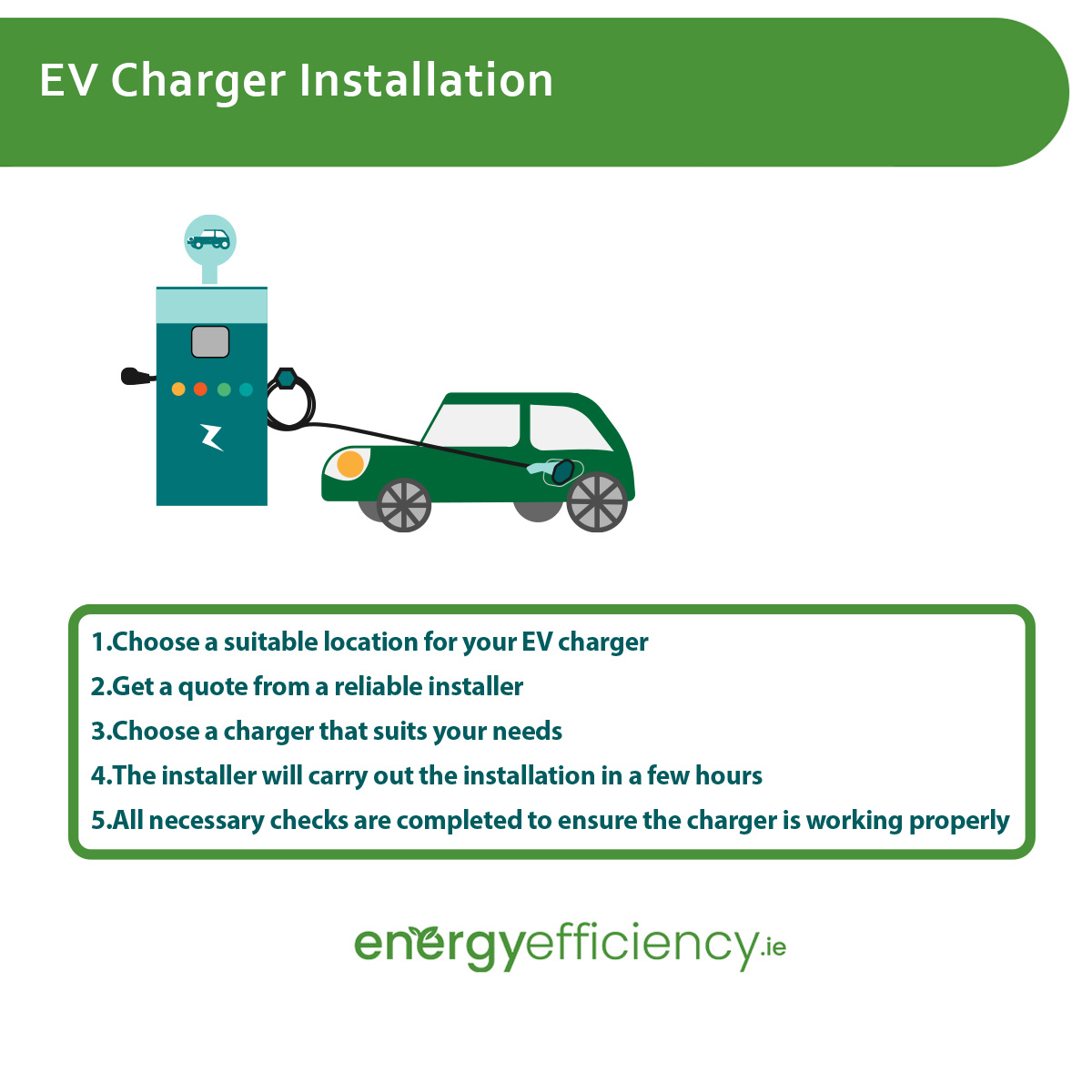Table of Contents
- Electric Car Chargers in Ireland – Our Top Picks!
- What to Consider when Choosing the Best Home EV Charger
- How much is an electric vehicle charger?
- Level 2 Home Charging Speeds
- Pros and Cons of Level 1 Home Chargers
- Public EV Charging Stations in Ireland
- Grants for Electric Car Chargers
- EV Charger Installation Process
- EV Charging Station FAQs
- Get an instant EV Charging Station Quote
Best EV Chargers in Ireland 2025

Written by: Michael Malone
Published: April 11, 2024
Last updated: October 19, 2025
Reading time: 5 mins
There have been over 40,000 new electric vehicles registered in Ireland since the start of 2023, and we could see a promising year for EVs in 2025 as charging infrastructure improves and more affordable models become available.
There are many benefits of electric vehicles including their environmental friendliness and overnight charging – which can significantly reduce costs by taking advantage of lower rates offered by electricity providers.
Motorists with an EV will typically install a Level 2 charger at home, which allows for much faster charging – eliminating range anxiety. Read on to find out what we believe are the best EV chargers in Ireland in 2025!
Electric Car Chargers in Ireland – Our Top Picks!

Wallbox Pulsar Plus
- Powerful and small
- Powers up to 22kW
- €300 SEAI grant
- Mobile app for added convenience
- Connect via WiFi or Bluetooth
- Compatible with fully electric and hybrid vehicles
- Tethered 5 meter cable
- Load balancing

Ohme Home Pro
- Up to 7.4kW power output
- €300 SEAI grant
- LCD screen
- Mobile app
- Tethered 5 meter cable
- Compatible with fully electric cars and hybrids
- Load balancing
- 3G/ 4G connectivity

Zappi Myenergi
- Powers 7kW – 22kW
- €300 SEAI grant
- Integrates with solar PV panels
- LCD screen
- Mobile app
- Tethered 5 meter cable
- Compatible with fully electric cars and hybrids
- Load balancing
Installing an Electric Charger?
Take our 2-minute questionnaire get an accurate EV charger quote
What to Consider when Choosing the Best Home EV Charger
There are 4 main things that we urge EV motorists for to consider when looking for the best home EV charger.
- 1We recommend choosing an installer which offers you a warranty of at least 3 years with your electric vehicle charger.
- 2Power output: As Level 2 home chargers have different power outputs, you should choose the correct size, depending on the size of your EV battery and your desired range (i.e. how far you normally travel each day).
- 3Interactive features such as a mobile app and an LCD screen might be something for you to consider if you wish to monitor your car charging.
- 4EV owners with solar panels may wish to have them integrated with their home charger, so if utilising solar charging is something you wish to avail of, look out for this feature in a home charge point.
How much is an electric vehicle charger?
Home EV chargers in Ireland usually costs between €800 and €1,200 – depending on the power output of the charger itself and the brand, and whether you can avail of the grant.
The overall cost will depend on things such as the power output of the charger, special features such as remote charging, and of course, who you choose to carry out the installation.
The Sustainable Energy Authority of Ireland (SEAI) offers €300 towards new home car chargers to incentivise people to have them installed. Read more about the range of government grants for EV chargers.
Level 2 Home Charging Speeds
Home EV charging speeds vary depending on two main factors – the power output of the charger and the battery size of your electric car.
Our Home EV Charger page has a comprehensive breakdown of charging speeds for different power outputs, but let’s have a quick look at some examples for medium-sized EV batteries here.
For a medium-sized car battery (65kW), a 7.4kW EV charger could charge your vehicle to 80% in under 6 hours.
This is reduced to under 4 hours with an 11kW electric car charger, and just 1 hour 45 minutes for a charger with a 22kW power output.
The type of charger that best suits your needs will depend on your unique circumstances and requirements, and the best way of getting a true picture of what will work best for you is to talk to an expert about your individual needs.
Pros and Cons of Level 1 Home Chargers

Level 1 Charging Pros
- There is usually no need to buy a Level 1 home charger as they come along with your electric vehicle
- They plug directly into the wall socket, meaning Level 1 charging is so easy and convenient
- You don’t need to spend money on the installation of a new charging unit
- They are useful for road users who travel only a few kilometres every day
- You can still take advantage of night-time rates offered by your electricity provider so that your car is ready to go the next morning
Level 1 Charging Cons
- They are much slower than Level 2 chargers
- Level 1 chargers can cause range anxiety due to their slower charging speeds
- They are generally not very useful for medium and large EV owners
- Level 1 charging can take up to 26 hours to power a large EV battery to 80%
Public EV Charging Stations in Ireland
There are hundreds of public EV charge points across the island of Ireland, meaning that those with longer journeys can rest assured that they will reach their destination.
With Level 2 home charging, an overnight charge (utilising cheaper electricity rates) will usually get your car battery to 80%, depending on the size of the EV battery and power output of your charger.
There are numerous charge points in every county which offer fast charging, however this also comes at a price.
For this reason, it is estimated that around 80% of electric car charging is done at home, and not at service stations or other public charging locations.
Grants for Electric Car Chargers

The Sustainable Energy Authority of Ireland (SEAI) has a number of grants to reduce the burden of making energy efficient changes to your home, and EV chargers are no different.
The SEAI currently offers a €300 grant towards a home EV charger to anyone who wishes to install one, regardless of whether they own an EV.
This grant value was previously €600 but was reduced to €300 at the start of 2024. As well as EV charging grants, the SEAI also offers solar panel grants and heat pump grants.
The eligibility criteria for the EV home charger grants include having the charger installed on an off-street area associated with the house, and applicants cannot have availed of a previous grant for a home e-car charger.
EV Charger Installation Process

The installation process for electric cars is quite simple, and can be completed in a few hours in most cases.
There are many companies offering home e-car charging installation services, and every installer that we recommend is fully vetted, trusted & reliable.
The installation process can be broken down into 5 simple steps:
- 1Choose a suitable location for your EV charger
- 2Get a quote from a reliable installer
- 3Choose a charger that suits your needs
- 4The installer will carry out the installation in a few hours
- 5All necessary checks are completed to ensure the charger is working properly
EV Charging Station FAQs
It is possible for some people to get by with the Level 1 charger that came along with their electric car. However, a Level 2 charger would be beneficial for the vast majority of EV owners due to much faster charging speeds.
You can do a quick Google search and browse through the various installation companies offering EV chargers, or simplify the process by getting a quote from one of our carefully chosen and reliable EV charger providers.
Range anxiety, when you’re worried that your EV will conk out before reaching your destination, is a problem often experienced by users of Level 1 chargers. With Level 2 charging, your EV will usually take you to your destination and home again without the need for a recharge. There are also hundreds of electric vehicle charging stations dotted across Ireland, which you can use for those longer journeys.
The lifespan of a Level 2 home charger will depend on the model you have installed. EV chargers typically last between 5–10 years, and sometimes up to 15 years before they need to be replaced.
It is recommended that those with an electric car charge station at home carry out an inspection every year to ensure that everything is spick and span. Having a professional carry out an annual check will prolong the lifespan of your electric vehicle, and could save you money in the long run.
Get an instant EV Charging Station Quote
If you are considering an Electric Vehicle charging station for your home or business, speak to Energy Efficiency today for the best quotes on the market.
Speak to Ireland’s leading source of information on all things home energy and find out how much you can save.
Best EV Chargers in Ireland 2025
Published: April 11, 2024
Last updated: October 19, 2025

Written by: Michael Malone
Reading time: 5mins
There have been over 40,000 new electric vehicles registered in Ireland since the start of 2023, and we could see a promising year for EVs in 2025 as charging infrastructure improves and more affordable models become available.
There are many benefits of electric vehicles including their environmental friendliness and overnight charging – which can significantly reduce costs by taking advantage of lower rates offered by electricity providers.
Motorists with an EV will typically install a Level 2 charger at home, which allows for much faster charging – eliminating range anxiety. Read on to find out what we believe are the best EV chargers in Ireland in 2025!
Electric Car Chargers in Ireland – Our Top Picks!

Wallbox Pulsar Plus
- Powerful and small
- Powers up to 22kW
- €300 SEAI grant
- Mobile app for added convenience
- Connect via WiFi or Bluetooth
- Compatible with fully electric and hybrid vehicles
- Tethered 5 meter cable
- Load balancing

Ohme Home Pro
- Up to 7.4kW power output
- €300 SEAI grant
- LCD screen
- Mobile app
- Tethered 5 meter cable
- Compatible with fully electric cars and hybrids
- Load balancing
- 3G/ 4G connectivity

Zappi Myenergi
- Powers 7kW – 22kW
- €300 SEAI grant
- Integrates with solar PV panels
- LCD screen
- Mobile app
- Tethered 5 meter cable
- Compatible with fully electric cars and hybrids
- Load balancing
Installing an Electric Charger?
Take our 2-minute questionnaire get an accurate EV charger quote
What to Consider when Choosing the Best Home EV Charger
There are 4 main things that we urge EV motorists for to consider when looking for the best home EV charger.
- 1We recommend choosing an installer which offers you a warranty of at least 3 years with your electric vehicle charger.
- 2Power output: As Level 2 home chargers have different power outputs, you should choose the correct size, depending on the size of your EV battery and your desired range (i.e. how far you normally travel each day).
- 3Interactive features such as a mobile app and an LCD screen might be something for you to consider if you wish to monitor your car charging.
- 4EV owners with solar panels may wish to have them integrated with their home charger, so if utilising solar charging is something you wish to avail of, look out for this feature in a home charge point.
How much is an electric vehicle charger?
Home EV chargers in Ireland usually costs between €800 and €1,200 – depending on the power output of the charger itself and the brand, and whether you can avail of the grant.
The overall cost will depend on things such as the power output of the charger, special features such as remote charging, and of course, who you choose to carry out the installation.
The Sustainable Energy Authority of Ireland (SEAI) offers €300 towards new home car chargers to incentivise people to have them installed. Read more about the range of government grants for EV chargers.
Level 2 Home Charging Speeds
Home EV charging speeds vary depending on two main factors – the power output of the charger and the battery size of your electric car.
Our Home EV Charger page has a comprehensive breakdown of charging speeds for different power outputs, but let’s have a quick look at some examples for medium-sized EV batteries here.
For a medium-sized car battery (65kW), a 7.4kW EV charger could charge your vehicle to 80% in under 6 hours.
This is reduced to under 4 hours with an 11kW electric car charger, and just 1 hour 45 minutes for a charger with a 22kW power output.
The type of charger that best suits your needs will depend on your unique circumstances and requirements, and the best way of getting a true picture of what will work best for you is to talk to an expert about your individual needs.
Pros and Cons of Level 1 Home Chargers

Level 1 Charging Pros
- There is usually no need to buy a Level 1 home charger as they come along with your electric vehicle
- They plug directly into the wall socket, meaning Level 1 charging is so easy and convenient
- You don’t need to spend money on the installation of a new charging unit
- They are useful for road users who travel only a few kilometres every day
- You can still take advantage of night-time rates offered by your electricity provider so that your car is ready to go the next morning
Level 1 Charging Cons
- They are much slower than Level 2 chargers
- Level 1 chargers can cause range anxiety due to their slower charging speeds
- They are generally not very useful for medium and large EV owners
- Level 1 charging can take up to 26 hours to power a large EV battery to 80%
Public EV Charging Stations in Ireland
There are hundreds of public EV charge points across the island of Ireland, meaning that those with longer journeys can rest assured that they will reach their destination.
With Level 2 home charging, an overnight charge (utilising cheaper electricity rates) will usually get your car battery to 80%, depending on the size of the EV battery and power output of your charger.
There are numerous charge points in every county which offer fast charging, however this also comes at a price.
For this reason, it is estimated that around 80% of electric car charging is done at home, and not at service stations or other public charging locations.
Grants for Electric Car Chargers

The Sustainable Energy Authority of Ireland (SEAI) has a number of grants to reduce the burden of making energy efficient changes to your home, and EV chargers are no different.
The SEAI currently offers a €300 grant towards a home EV charger to anyone who wishes to install one, regardless of whether they own an EV.
This grant value was previously €600 but was reduced to €300 at the start of 2024. As well as EV charging grants, the SEAI also offers solar panel grants and heat pump grants.
The eligibility criteria for the EV home charger grants include having the charger installed on an off-street area associated with the house, and applicants cannot have availed of a previous grant for a home e-car charger.
EV Charger Installation Process

The installation process for electric cars is quite simple, and can be completed in a few hours in most cases.
There are many companies offering home e-car charging installation services, and every installer that we recommend is fully vetted, trusted & reliable.
The installation process can be broken down into 5 simple steps:
- 1Choose a suitable location for your EV charger
- 2Get a quote from a reliable installer
- 3Choose a charger that suits your needs
- 4The installer will carry out the installation in a few hours
- 5All necessary checks are completed to ensure the charger is working properly
EV Charging Station FAQs
It is possible for some people to get by with the Level 1 charger that came along with their electric car. However, a Level 2 charger would be beneficial for the vast majority of EV owners due to much faster charging speeds.
You can do a quick Google search and browse through the various installation companies offering EV chargers, or simplify the process by getting a quote from one of our carefully chosen and reliable EV charger providers.
Range anxiety, when you’re worried that your EV will conk out before reaching your destination, is a problem often experienced by users of Level 1 chargers. With Level 2 charging, your EV will usually take you to your destination and home again without the need for a recharge. There are also hundreds of electric vehicle charging stations dotted across Ireland, which you can use for those longer journeys.
The lifespan of a Level 2 home charger will depend on the model you have installed. EV chargers typically last between 5–10 years, and sometimes up to 15 years before they need to be replaced.
It is recommended that those with an electric car charge station at home carry out an inspection every year to ensure that everything is spick and span. Having a professional carry out an annual check will prolong the lifespan of your electric vehicle, and could save you money in the long run.
Get an instant EV Charging Station Quote
If you are considering an Electric Vehicle charging station for your home or business, speak to Energy Efficiency today for the best quotes on the market.
Speak to Ireland’s leading source of information on all things home energy and find out how much you can save.
Solar Energy Saves Households Thousands in Electricity Costs
Take our 2-minute questionnaire and find affordable solar options to suit your budget and lifestyle.


